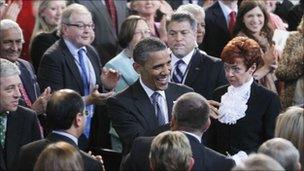Analysis: What Obama visit says about UK-US alliance
- Published

Face in the crowd: President Obama received a rapturous reception
President Obama does a good line in luxuriant praise.
The Magna Carta, Winston Churchill and "one of the oldest and strongest alliances the world has ever known" were all celebrated in his Westminster Hall speech.
The President was determinedly upbeat.
On Iraq, he said "our combat mission has ended". On Afghanistan, he declared: "We have broken the Taliban's momentum".
He added: "We will not relent until the people of Libya are protected, and the shadow of tyranny is lifted."
At the heart of his speech was the case for the US, the UK and their allies to play a leading role in global politics.
Unlike President Roosevelt and Churchill they could not set right the world over a brandy, he said, but these countries remained the "greatest catalysts for global action".
Members of Parliament who shared their excitement with the world on Twitter just waiting for the President to arrive made their appreciation obvious as he reminded them he was the grandson of a Kenyan who served as a cook in the British Army.
Barbecue images
But even before the standing ovation at the conclusion of his speech was complete, they were picking through Barack Obama's state visit comments seeking support for their own political arguments, or evidence of splits with the prime minister.
Earlier, at their joint press conference, David Cameron said: "The president and I agree that we should be turning up the heat in Libya."
It was almost as if he foresaw reporters using folksy pictures of him and President Obama cooking burgers for veterans in the Downing Street garden to illustrate his point.
The President, though, struck a different tone there.
"I think there may be a false perception that there are a whole bunch of secret, super-effective air assets that are in a warehouse somewhere that could just be pulled out and that would immediately solve the situation in Libya," he said.
"That's not the case."
There would be a slow, steady process, he said, and patience was necessary.
Libya limitations
Even as the state visit began the US press corps were reminded by the White House that President Obama had told the UK that the US commitment in Libya would be "limited in scope and duration".
The director of the Royal United Services Institute think tank, Professor Michael Clarke, said the strikes by US unmanned Predator drones taking place in Libya were the sort of intervention the military coalition opposing Colonel Gaddafi most wanted.
President Obama's visit has attracted considerable public interest
But there were those in the Conservative Party who hoped for more from the President than comments about patience, slow progress and limitations.
One senior Tory backbencher said: "How can he say all that and not help more in Libya?"
The Conservative vice chairman of the party's backbench foreign affairs and defence committee, Mark Pritchard, said: "The United States military is doing much; but the reluctance of President Obama, for primarily domestic political reasons, not to fully commit the United States to the conflict in Libya could unhelpfully prolong the conflict."
Rival British politicians were also listening carefully to the President's words on the economy.
David Cameron sought common ground when he said debt ratios on both sides of the Atlantic would be falling by the second half of this decade - a target set for the UK by the Chancellor.
The President acknowledged the "sequencing or pace" of the two countries' efforts to deal with their deficits could turn out to be different, but said that was down to differences in their economies and the pressures they faced.
He also said both governments wanted to achieve the same ends without mortgaging their futures and leaving a mountain of debt to future generations.
Unsurprisingly both the UK government and opposition drew from those quotes to claim the President's support for their arguments.
Pivotal relationship
Labour said David Cameron would be disappointed the President had refused to support his economic policy.
Government sources suggested he had said everything they would have said about the need for countries to live within their means while protecting spending on infrastructure and technology.
The inevitable arguments about what President Obama really meant, underlined a simple point.
No one could emerge from this state visit doubting America's influence; certainly not David Cameron who hitched a lift in the famous Presidential limousine.
The special relationship, described repeatedly as "essential" during the visit, retains its place at the centre of British foreign policy.
The announcements about collaboration between the US and the UK made public during the press conference served, of course, to underline the point.
As the pageantry and press conferences of the visit played out, the vast US aircraft carrier the USS George H.W. Bush was off the British coast taking part in a major international military training exercise.
Some in David Cameron's party will watch the president leave for the G8 in France wishing the US had promised to commit a little more of that force to the fight to oust Colonel Gaddafi.
